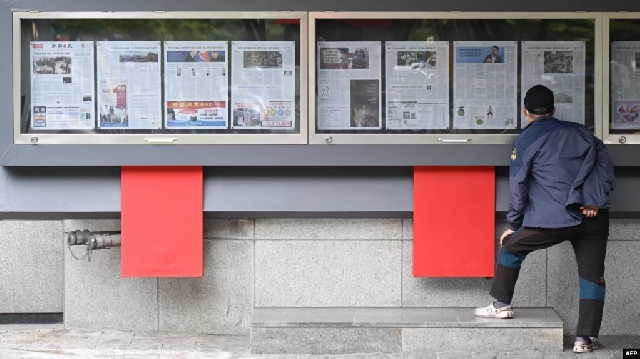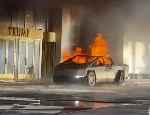South Korea threatens to send arms, personnel to Ukraine
 A man reads a newspaper displayed on a street in Seoul on Oct. 21, 2024. Some of the pages contain coverage of allegations that North Korea has decided to deploy thousands of soldiers for Russia on Ukraine's front lines
A man reads a newspaper displayed on a street in Seoul on Oct. 21, 2024. Some of the pages contain coverage of allegations that North Korea has decided to deploy thousands of soldiers for Russia on Ukraine's front lines
South Korea is renewing its threat to send weapons to Ukraine, days after releasing intelligence alleging that North Korea plans to deploy a large number of troops to support Russia’s invasion.
South Korea will consider sending Ukraine “weapons for defense and attack,” according to the Yonhap news agency, which cited an unnamed senior presidential official on Tuesday.
Yonhap also reported Seoul may send military and intelligence personnel to Ukraine to analyze North Korean battlefield tactics and assist in interrogations of captured North Koreans.
In a statement, South Korea’s National Security Council called for the “immediate withdrawal” of North Korean troops from Russia and pledged unspecified “phased countermeasures.”
The warning marks one of Seoul's strongest yet, as concerns rise over North Korea's deepening involvement in the Ukraine conflict.
Last week, South Korea’s intelligence agency said North Korea already has sent about 1,500 special forces to Russia to join the war in Ukraine, and it is planning to deploy a total of 12,000 troops from an elite unit.
U.S. and NATO officials have said they cannot confirm the North Korean troop deployment but have condemned North Korea-Russia military cooperation, including Pyongyang's supply of artillery and missiles for use in Ukraine.
Western countries have long urged South Korea, one of the world’s biggest weapons exporters, to directly arm Ukraine. South Korea has resisted, fearing this could prompt Russia to expand military ties with North Korea, which seeks advanced weapons targeting Seoul.
Strategic shifts
However, some analysts believe South Korea’s strategic calculations may be changing, since North Korea-Russia ties are growing despite Seoul’s caution.
Earlier this year, North Korea and Russia restored a Cold War-era mutual defense treaty, opening the door for a much wider range of military cooperation.
By sending troops to Ukraine, North Korea’s military could gain valuable battlefield experience, secure financial support to bolster the country’s struggling economy and lay the groundwork for future joint drills with Russia, according to analysts.
There are also fears in Seoul that Pyongyang seeks advanced military technology from Moscow, potentially including help with its nuclear, missile or satellite programs.
These concerns likely explain South Korea’s strong response to North Korea’s involvement in Ukraine, said Mason Richey, a professor at Hankuk University of Foreign Studies in Seoul.
“To me the easiest explanation is that South Korea thinks North Korea is getting something sufficiently valuable for that troop deployment, so that it makes sense to take some risk to impose costs on Russia,” Richey said.
South Korea’s calculations
A decision to arm Ukraine also could play into South Korean President Yoon Suk Yeol’s foreign policy mantra of “peace through strength,” said Ben Engel, who teaches political science and international relations at Dankook University outside Seoul.
“They won't look very strong if they don't react somehow. And sending weapons to Ukraine is something they are de facto doing already,” Engel said. “So, doing it explicitly seems like an easy step to show strength.”
South Korea has so far provided weapons only to third parties such as the United States and Poland, which are directly supplying weapons to Ukraine.
Officials often defend this stance by citing domestic laws that restrict the export of arms to active conflict zones, although Yoon also has hinted that these barriers could be bypassed.
One way Yoon could get around such restrictions would be to use a legal loophole meant to allow the provision of aid to developing countries, according to South Korean lawmaker Kim Joon-hyung.
Kim, who opposes South Korean involvement in the Ukraine war, said he soon plans to introduce legislation that would restrict such a move.
Some public opinion polls suggested that most South Koreans oppose arming Ukraine, although the subject has not been a matter of intense public debate.
Some analysts suggest South Korea may also be weighing the outcome of the upcoming U.S. election before making any decisive moves — especially since former President Donald Trump has suggested he would reduce support for Ukraine.
"There's little sense in responding positively to appeals that [U.S. President Joe] Biden and NATO made six months ago if Trump wins,” said Jeffrey Robertson, a professor of diplomatic studies at Seoul’s Yonsei University.
Long-term shift
Beyond political considerations such as the U.S. election, some experts warn that the deepening strategic alignment between North Korea and Russia presents long-term challenges that threaten South Korea’s security.
Hyun Seung-soo, a researcher specializing in Russia at the Korea Institute for National Unification, said that the relationship between North Korea and Russia is evolving beyond short-term military cooperation.
“People tend to think that North Korea will just send a few soldiers, receive economic support and get minor military technologies in return. But Kim Jong Un’s perspective is much broader than that,” Hyun said.
“For North Korea, fighting in Russia is not just about helping Russia — it’s seen as participating in North Korea’s own sacred war against the U.S.,” he said. “Their mindset could be that they live, fight and die together with Russia.”
This broader realignment could have serious implications for South Korea, Hyun warned.
“Although the number of troops being deployed might be small, the implications of such deployment are significant,” Hyun said. “It’s an action by Russia and North Korea that could change the global political landscape.”
Source: voanews.com/William Gallo








